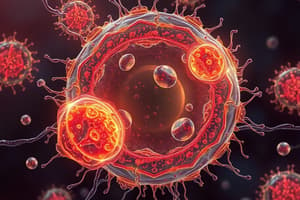Podcast
Questions and Answers
Which of the following is an example of a unicellular organism?
Which of the following is an example of a unicellular organism?
- Algae (correct)
- Human
- Dog
- Fungus
What is the function of the mitochondria in a cell?
What is the function of the mitochondria in a cell?
- Transporting materials
- Synthesizing proteins
- Storing genetic material
- Producing energy (correct)
What are the unifying themes in biology?
What are the unifying themes in biology?
The unifying themes in biology are the presence of cells, hereditary information encoded in genes, evolution, energy processing, and the ability of organisms to regulate their internal environments.
Which of the following is an example of an organ system?
Which of the following is an example of an organ system?
What is the importance of energy processing in living organisms?
What is the importance of energy processing in living organisms?
What is the scope of biology?
What is the scope of biology?
What are the levels of organization that biologists study in biology?
What are the levels of organization that biologists study in biology?
What is the role of the scientific method in biology?
What is the role of the scientific method in biology?
Flashcards
Unicellular Organisms, Examples?
Unicellular Organisms, Examples?
Organisms composed of a single cell, including bacteria, yeast, and some protists (e.g., E. coli, brewer's yeast).
Mitochondria Function
Mitochondria Function
Produce ATP (energy) through aerobic respiration.
Unifying Themes in Biology (1)
Unifying Themes in Biology (1)
Evolution explains life's diversity and adaptations.
Unifying Themes in Biology (2)
Unifying Themes in Biology (2)
Signup and view all the flashcards
Organ Systems Example
Organ Systems Example
Signup and view all the flashcards
Energy Processing Importance
Energy Processing Importance
Signup and view all the flashcards
Scope of Biology
Scope of Biology
Signup and view all the flashcards
Scientific Method in Biology
Scientific Method in Biology
Signup and view all the flashcards
Study Notes
Unicellular Organisms
- Unicellular organisms consist of a single cell and include bacteria, yeast, and some protists.
- Examples include Escherichia coli (E. coli) and Saccharomyces cerevisiae (brewer's yeast).
Function of Mitochondria
- Mitochondria are known as the powerhouse of the cell.
- Their primary function is to produce ATP (adenosine triphosphate) through aerobic respiration, supplying energy for cellular processes.
Unifying Themes in Biology
- Evolution: Explains the diversity of life and adaptation of organisms.
- Structure and function: Highlights the relationship between biological structures and their functions.
- Information flow: Covers how genetic information is transmitted and expressed.
- Interactions: Focuses on the relationships and interactions within and between ecosystems.
Organ Systems
- An organ system consists of a group of organs working together to perform specific functions.
- Examples include the respiratory system (lungs and airways) and the circulatory system (heart, blood vessels).
Importance of Energy Processing
- Energy processing is crucial for growth, reproduction, and maintaining homeostasis in organisms.
- Organisms convert energy from food into usable forms, regulating life processes and enabling cellular activities.
Scope of Biology
- The scope of biology includes the study of living organisms, their interactions, and environments.
- Areas of focus range from molecular biology to ecology and evolutionary biology.
Levels of Organization in Biology
- Levels of organization include atoms, molecules, cells, tissues, organs, organ systems, organisms, populations, communities, ecosystems, and the biosphere.
- Each level represents a different aspect of biological complexity and organization.
Role of the Scientific Method
- The scientific method is a systematic approach to inquiry that involves observation, hypothesis formation, experimentation, and analysis.
- It enables biologists to formulate theories, advance knowledge through experimentation, and validate findings through peer review.
Studying That Suits You
Use AI to generate personalized quizzes and flashcards to suit your learning preferences.




